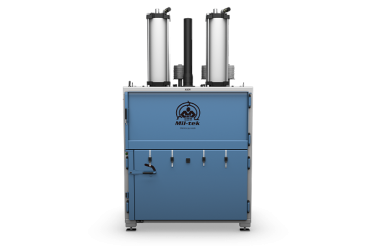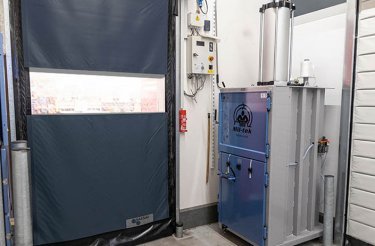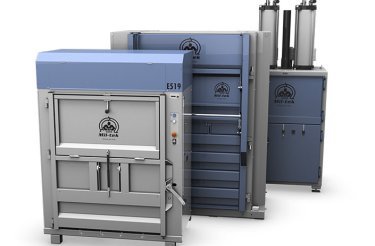
How does a cardboard baler work?
A simple guide to how cardboard balers operate in the workplace.
Looking for a baler?
Cardboard balers are useful
If you operate a business that handles any form of packaging, it likely produces some amount of cardboard waste.
If that is the case, a cardboard baler can be a very useful addition that not only makes the workplace tidier and safer but is also better for the environment.
Although there are many shapes and sizes and types of cardboard balers that are custom designed to fit different business sectors and industries, they all work in the same quintessential way: they compact cardboard into smaller volume so that you can more easily move it, more easily have it collected and more easily have it recycled.

How a cardboard baler works
Here’s a detailed, step-by-step explanation of how a cardboard baler works:
- Connect the baler to a power supply. Whether it’s a hydraulic baler or a pneumatic baler, you will need a suitable power source.
- Ensure that the operator is either a trained staff member or that a trained staff member is present.
- Load the cardboard into the baler’s chamber
- Once the chamber is full, close the main door and pull the activation switch
- This activates the baler’s ram, which presses down the cardboard
- For safety reasons, EN16500-compliant balers allow no access to moving parts
- Repeat until the cardboard inside the chamber forms a compact bale and the machine indicates that it ready to be emptied
- Tie off the resulting bale using appropriate banding
- Empty the baler through either a manual or automated bale-out mechanism
- Stack and store the cardboard bales which can be collected by a recycler
Different sizes and types of cardboard balers
Hydraulic cardboard balers are typically large, whereas pneumatic balers are often smaller and recommended for smaller load and lean, on-production applications.
On the smaller end, small-footprint cardboard balers can compress around 35kgs of cardboard, but for large factories or warehouses, you can find balers that can house up to 500kgs of cardboard.
Beyond that, horizontal balers process large volumes of packaging material. You can also find balers that work with cardboard as well as plastic.
Cardboard balers have a long lifespan, are easy to use, easy to maintain, and require only minimal staff training.

Many baler options
There are many different models and brands of cardboard baler and while they all perform a similar function, they operate differently.
Always ensure that you and your fellow employees are fully trained or certified (if required) to use the equipment. If in doubt, consult the operating manual or contact the supplier.

Have a question?
Get in touch today to learn more about how Mil-tek can help your business save time, space and money by better handling waste.